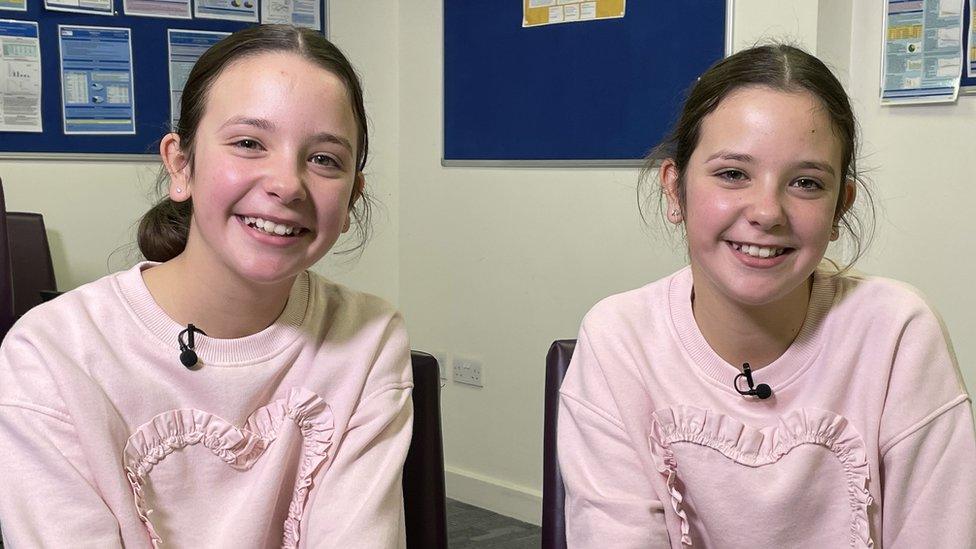Conjoined twins given days to live are proving world wrong
- Published
"This is what I wanted, for them to have a normal life"
Marieme and Ndeye were not expected to survive for more than a few days when they were born.
Now aged seven, they are thought to be the only growing conjoined twins in Europe.
While both girls have their own unique personalities and moods, they rely on each other to survive.
"When you are told from the beginning there is no future, you just live for the present," said their dad, Ibrahima.
Conjoined twins are rare, representing about one in every 500,000 live births in the UK.
Around half are stillborn, with another third dying within 24 hours of birth.
So seeing Marieme and Ndeye celebrate their seventh birthday with a classful of friends doesn't just give Ibrahima joy, but also to the doctors who have cared for them.
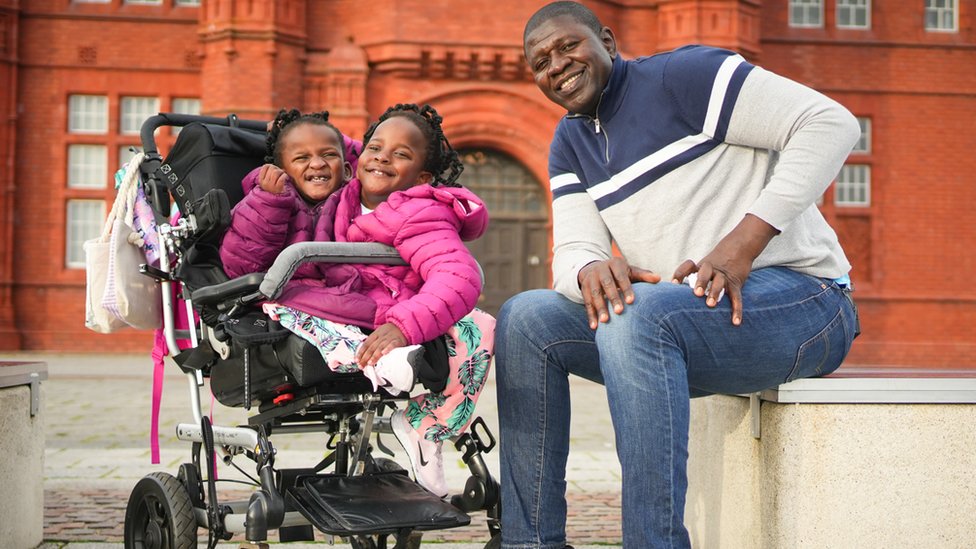
Ibrahima kept his daughters Marieme and Ndeye in the UK to stay under the medical supervision of Great Ormond Street Hospital
Marieme and Ndeye share one pair of legs and one pelvis but each has a spinal cord and a heart.
They have round-the-clock care but go to a mainstream school in south Wales with their friends.
"They are fighters and proving everyone wrong," said Ibrahima.
"My daughters are very different. Marieme is very quiet, an introverted personality, but it's completely different with Ndeye, she's very independent.
"I would not pretend it's easy but it's a huge privilege. You feel lucky to witness this constant battle for life."
When the twins were born in Senegal in 2016, their parents had been expecting one baby. Doctors didn't expect them to live much longer than a few days.
"I was preparing myself to lose them very quickly," Ibrahima told the BBC's Inseparable Sisters documentary.
"The only thing we could do is be beside them and not allow them to walk alone through this journey. We saw very clearly early on that we were dealing with warriors, who hang on to life."
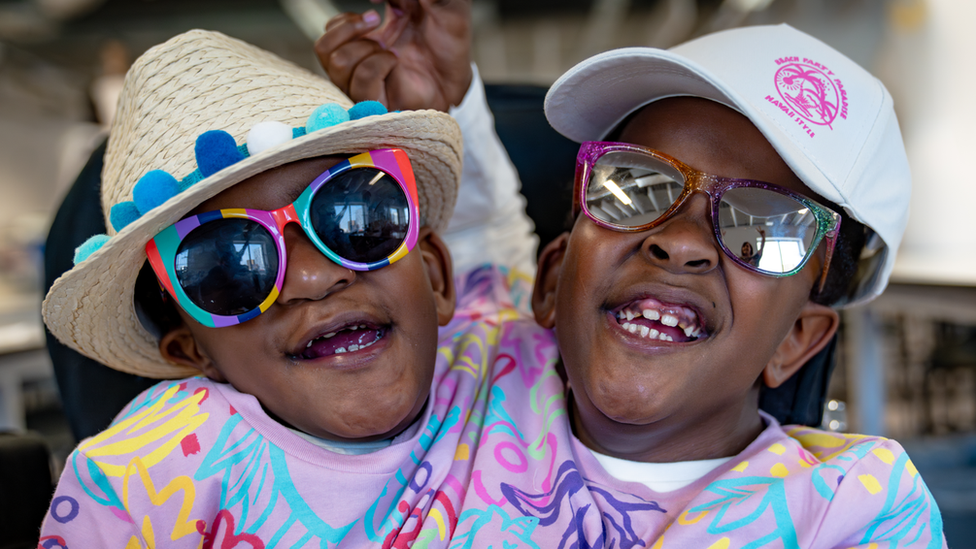
Marieme and Ndeye enjoy trying on clothes at the University of South Wales fashion department
Their best chance of survival was believed to be separation, according to doctors in Senegal
After calling hospitals around the world "begging" for help, the family arrived in the UK for treatment at Great Ormond Street Hospital in London in 2017.
Ibrahima hoped that the renowned children's hospital, which had separated more conjoined twins than anywhere in the world, would be able to separate them and that they could go back home to their brothers and sisters in Dakar - but it didn't work out that way.
Tests found that Marieme's heart was too weak for the complex surgery, and she would not survive the operation.
Ibrahima and a huge team of medical experts discussed at length the complex decision of whether or not to separate the girls.
It was eventually decided their best option would be not to separate them.
"It was killing one of my children for another, it's something I can't do," Ibrahima said at the time.
"I can't allow myself to choose who will live and who will die now."
As their mum returned to Africa to look after their other children, Marieme, Ndeye and Ibrahima remained in the UK for medical care and the three moved to Cardiff.

An uplifting insight into the lives of seven-year-old conjoined twins, who weren't expected to live more than a few days.
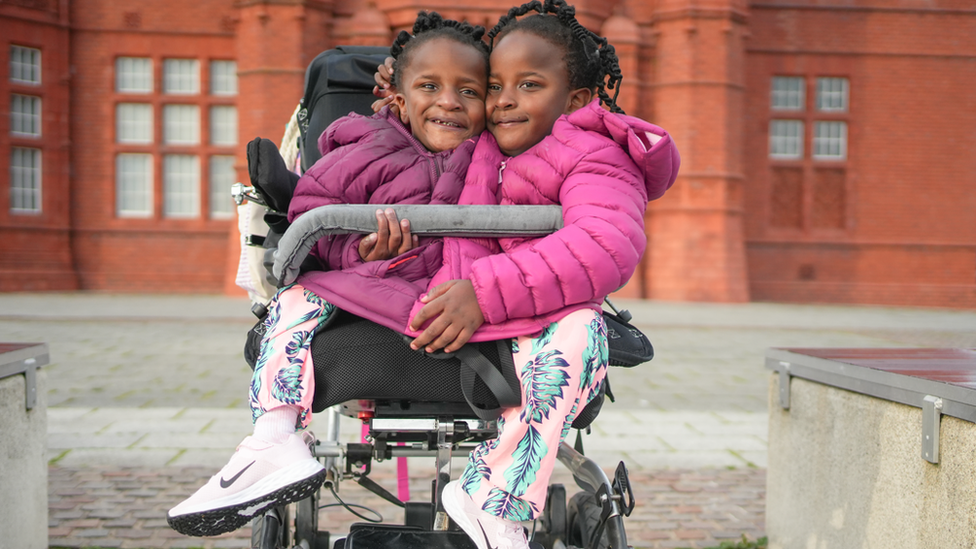
Marieme and Ndeye remained in the UK for the medical care that was not available to them at home in Senegal
Inseparable Sisters will be available on BBC iPlayer from Wednesday and on BBC One on Wednesday at 22:40 GMT. For viewers in Wales, it will be on BBC One Wales on Wednesday at 20:00 GMT.

"Not being able to go back home was very difficult because you had the rest of your family and your job back home," said Ibrahima, who is the former managing director of a travel organisation in Senegal.
"It's into the unknown but I didn't think too much, I just followed my heart. It is my parental responsibility to make sure they will have somebody who will be here for them, that will be my life purpose."
The twins need regular hospital check ups as they are at serious risk from infection and heart failure.
"At first it was a bit of a novel excitement and then a realisation that this is something I've only ever read about in text books," said Dr Gillian Body, a consultant paediatrician at the University Hospital of Wales.
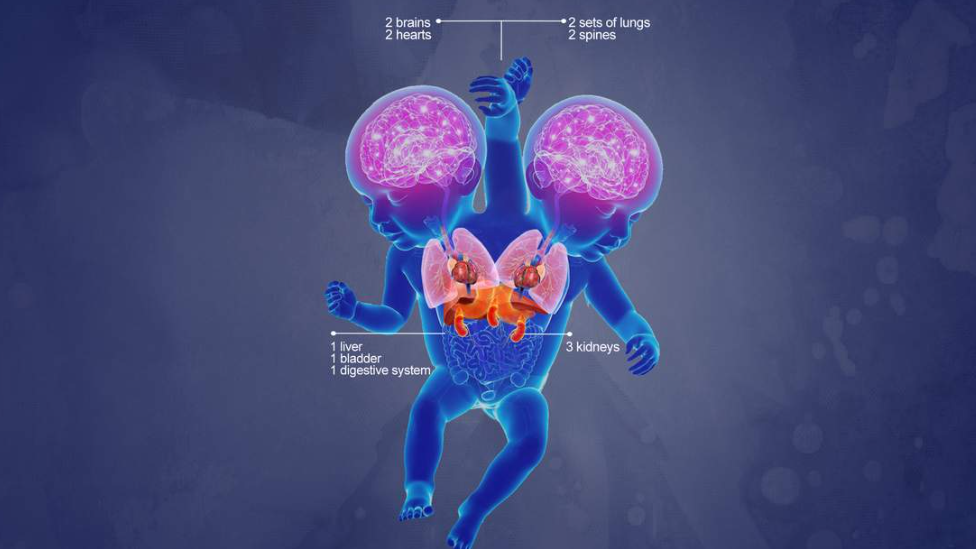
Marieme and Ndeye share some major organs and they also have their own separate organs
"They've got one pair of legs between them and one pelvis. Moving up through their abdomen we've got a lot of different organs. We don't know exactly, but we know some bits are shared and they have some individual bits.
"They've two separate spinal cords with all their nerves yet somehow they completely coordinate and they don't have to tell each other how to move an arm or how to move a leg, it just works."
Clothing the twins is challenging.
"You have to buy two identical tops and take them to the alterations shop to join them together," said Ibrahima.
"They have two legs, so they can have regular trousers, but their hip is very wide so you have to take that to the alternations shop too."
The family have now integrated into their community in Cardiff and the twins are looked after night and day as carers help dad with respite support.
They are in year three at their local mainstream primary school, where the sisters are helped by two classroom support workers.
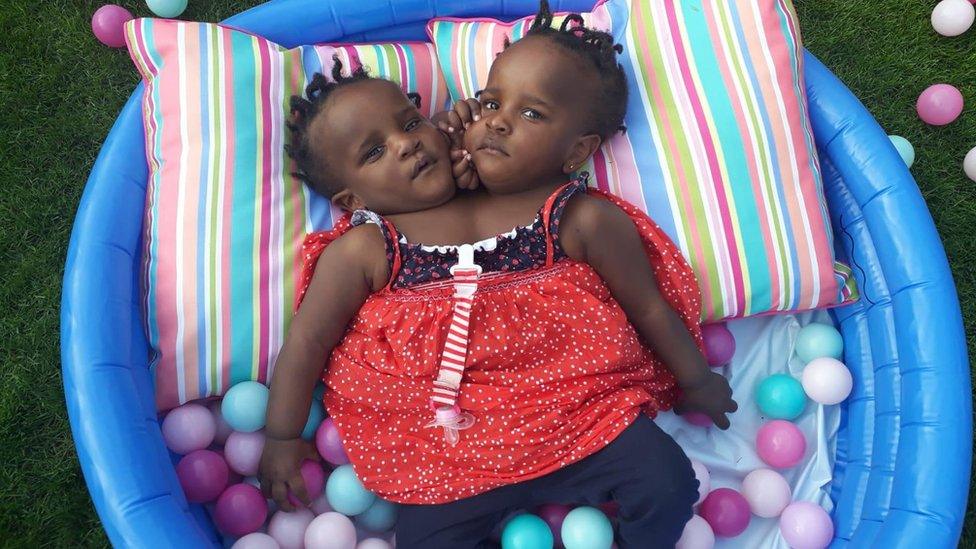
Marieme and Ndeye weren't expected to last a few days but have defied medical expectations and grown stronger
"I want them to have a normal life, play and laugh with kids and make friends and develop as individuals," said Ibrahima.
"They don't have to hide from anybody and being in mainstream school shows they're part of society and they are lucky to be part of this community."
The next challenge for Marieme and Ndeye is to try to stand and walk. They are currently managing about 20 minutes each day with the help of a standing frame.
"They have achieved things that nobody thought they would," said Ibrahima.
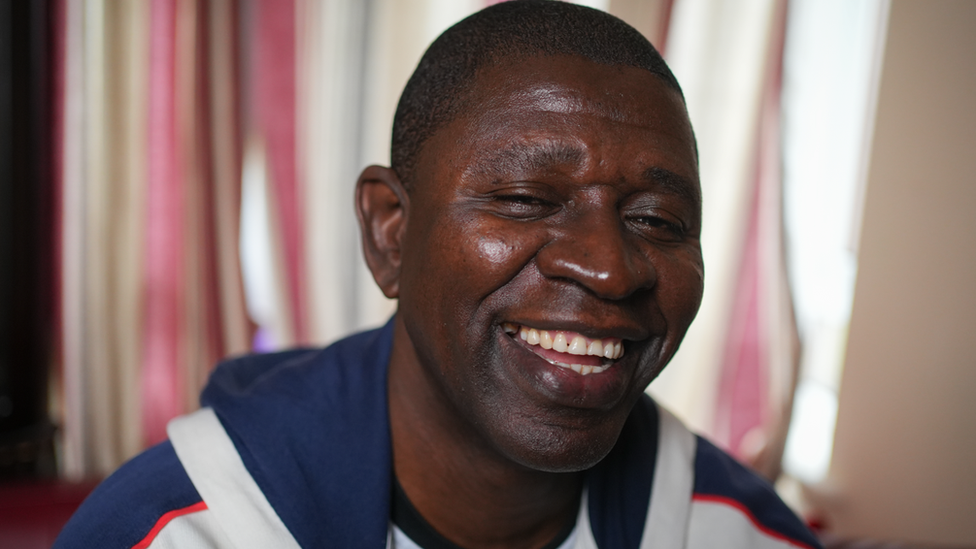
Ibrahima is grateful for the "dedicated" surgeons, doctors, school staff, classroom support workers and carers that help him look after Marieme and Ndeye
"When you're told from the beginning there is no future, you live for the present," he added.
"I know that any time, I can receive a call to say that something bad has happened.
"How long? I don't want to know. We're going to make every day a surprise and celebrate life.
"It can be conflicting but you feel lucky despite whatever the difficulties you're having. They are bringing me such joy. It is a huge blessing to be their dad."

JUNE: VOICE OF A SILENT TWIN: The tragic story of June, her sister and their life in Broadmoor
THE LEARNERS IS BACK: It's a new term for Jonesy's merry band of students

- Published5 January 2021
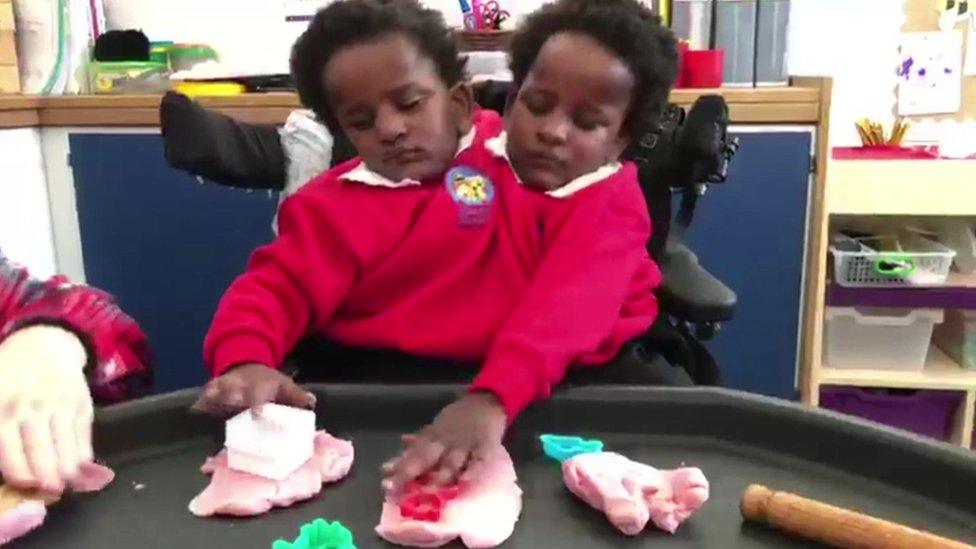
- Published5 August 2019
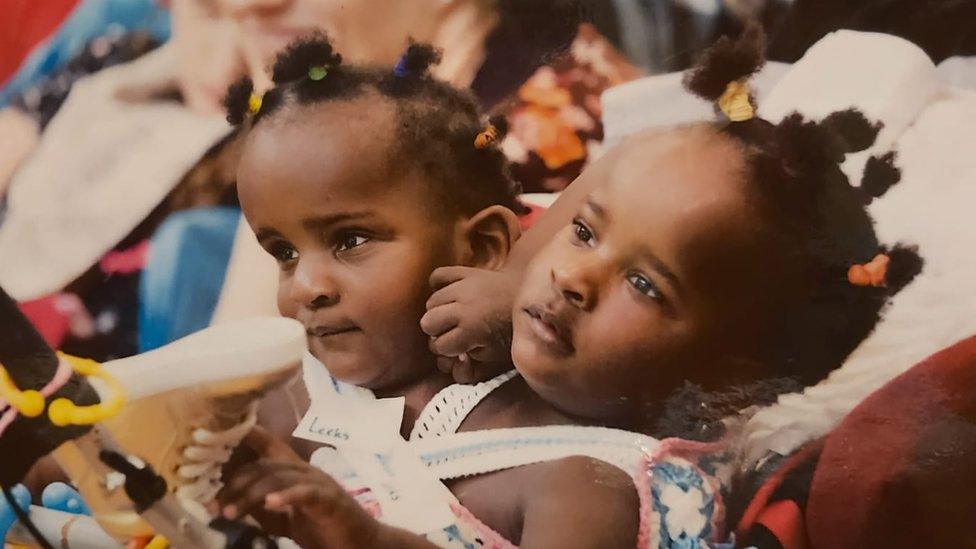
- Published23 January 2019
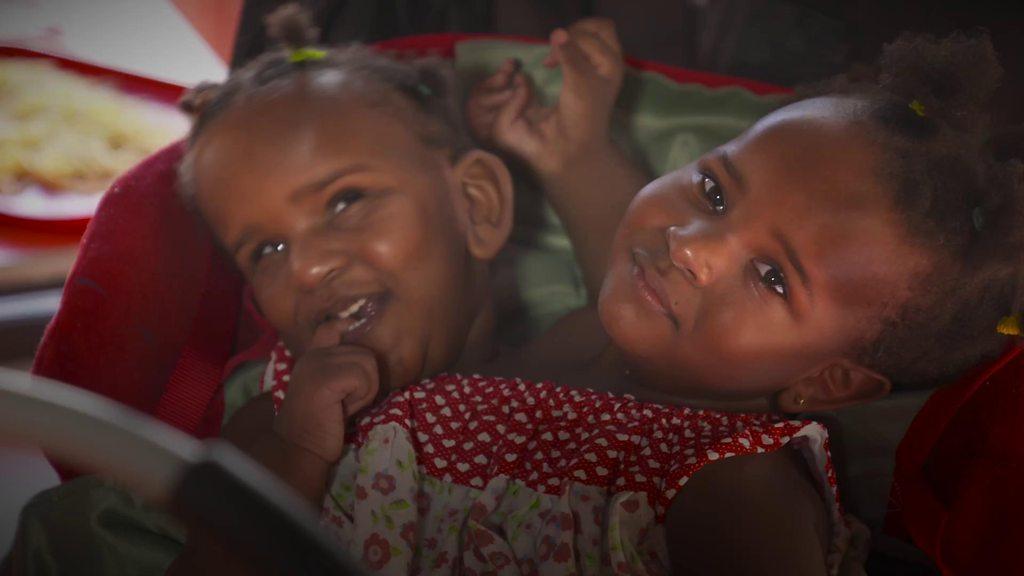
- Published24 April 2013
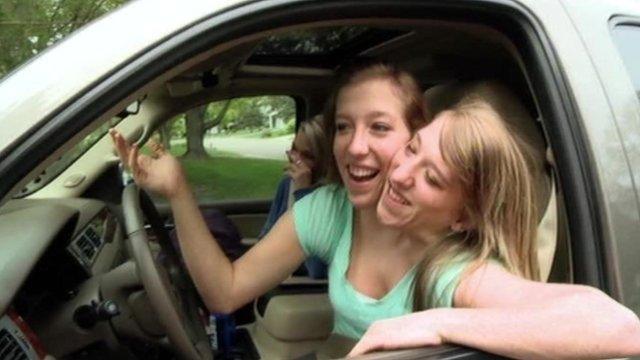
- Published27 October 2023
